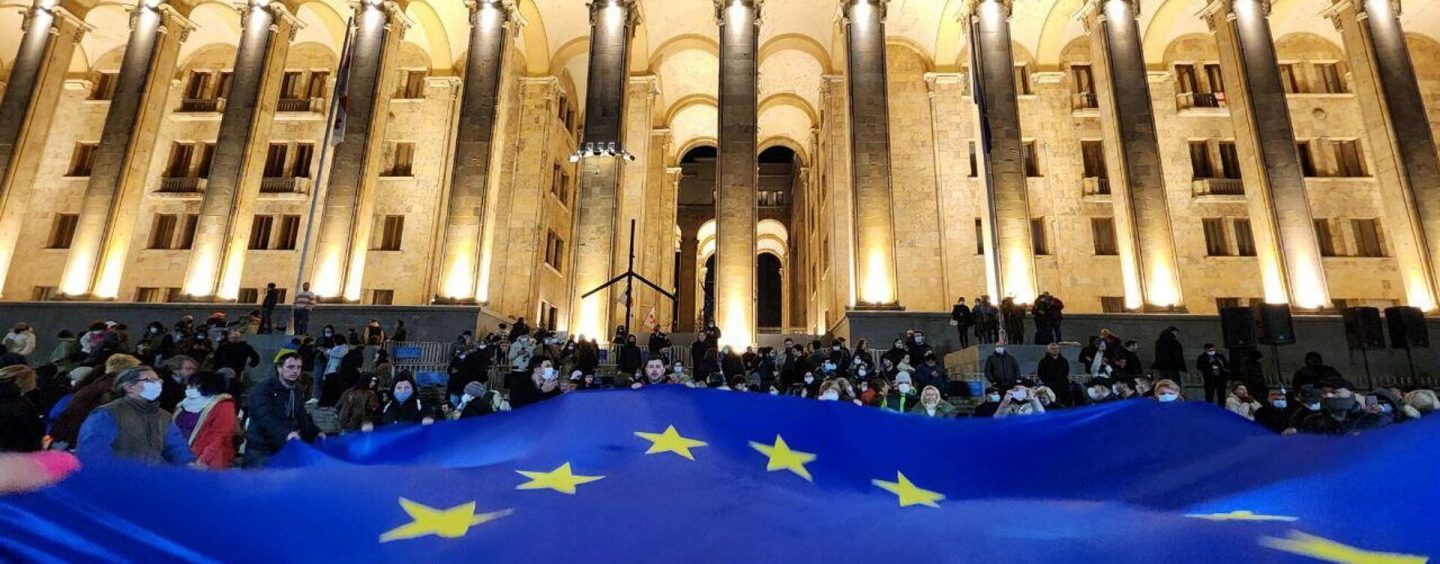By Nika Chitadze, Professor of the International Black Sea University, Director of the Center for International Studies President of the George C. Marshall Alumni Union, Georgia – International and Security Research Center
As is known, at the beginning of March 2023, the Parliament of Georgia discussed draft laws (2 documents) “on agents of foreign influence” and supported by the first hearing (with 76 votes) the first bill.
The discussion of the mentioned draft laws took place against the background of fierce protests both in the parliament and outside the parliament.
The bills were submitted by the political party “People’s Power”, which is a satellite party of the ruling party, “Georgian Dream”.
Initially, the draft law “On transparency of foreign influence” was registered in the parliament. To “ensure transparency”, the mentioned draft law required the registration as agents of foreign influence of such non-entrepreneurial (non-commercial) legal entities and media means, whose income (more than 20%) is received from abroad.
According to the draft law, everyone who was considered to be an “agent of foreign influence” had to be registered in the public registry with the same name in a mandatory manner. At the time of registration, it would be necessary to reflect the received income. At the same time, the organizations were obliged to fill in the financial declaration every year.
The draft law on “detection of agents of foreign influence” granted the Ministry of Justice the authority to conduct an investigation and study-monitoring of the issue at any time.
According to the same project, the basis for starting the monitoring should have been the decision of the relevant authorized person of the Ministry of Justice and the written statement submitted to the Ministry of Justice, which “contains an appropriate reference related to a specific agent of foreign influence”.
Avoiding registration as an agent of foreign influence or not filling out the declaration would result in the organization being fined 25 thousand Georgian Lari (GEL). The project also provided for the following types of fines:
- 10 thousand GEL if the organization does not fill out the application form within 10 working days from the entry of the information on the website of the Ministry of Justice;
- in case of non-correction of defects in the documents within the specified period – 10 thousand GEL;
- Committing a legal offense after one month – 20 thousand GEL.
As for the second bill – “On the registration of foreign agents”, taking into account the mentioned bill, any natural and legal person who would receive funding from abroad should have the obligation to register as a foreign agent.
Non-fulfillment or improper fulfillment of the obligation stipulated by the Law “On Registration of Foreign Agents” would result in criminal liability and would be punishable by a fine or imprisonment for a term of up to 5 years.
According to the draft, entities that met the criteria of being an agent of a foreign power established by the draft law were required to apply to the Attorney General and request to be registered as an agent of a foreign power.
The said law would not apply to diplomats, consuls, and employees of the diplomatic service and consular institution. The law would also not apply to foreign officials, a person engaged in charitable activities (authorities of Georgia very often underline that Bidzina Ivanishvili, who is considered an oligarch by the west is involved only in charitable activities), and a person “engaging in religious, educational, scientific, academic, or artistic activities in good faith.”
The Georgian law on “foreign agents” is Russian and here’s why
Hundreds of Georgian human rights activists (defenders) and journalists said that the government would first interfere in the activities of the civil society organizations and finally would force those organizations to be closed. If any of the two bills registered in the parliament were to be approved, “Georgian Dream” would be able to do so.
Both America and Russia have the law, the stated purpose of which was to reduce the influence of “foreign powers” on politicians and their decisions.
But in America, the government must first prove that the potential agent acts against the national interests of the country. Such proof is not required in Russia. Receiving money from abroad already means being an “agent”. It was with the Russian approach that the “people`s power” law “on the transparency of foreign influence” was supposed to work.
When and for what purpose were laws on agents passed?
In 1938, America became aware of the fact that the influence of Nazi Germany and the Communist Soviet Union was growing in the world, including the USA. In response to the threat, the US Congress passed FARA (Foreign Agents Registration Act). Everyone who acted in America for the benefit of a foreign country (we will return to this ambiguity later) and received an income in return had to become an “agent”.
At the end of 2011, large protests were held in Russia. Tens of thousands of people took to the streets demanding re-elections and democratic reforms. The Kremlin claimed that these people were controlled and financed by the West. In 2012, the State Duma passed the Law on Foreign Agents to “protect Russia’s internal politics from external interference”.
Georgia applied for EU membership in 2022 but failed to receive candidate status. To implement the mentioned goal, Europe gave 12 recommendations to the Georgian authorities. One of them is related to cooperation with non-governmental organizations, and the other – is the protection of media freedom. Neither the authors of the law nor its supporters can justify why they were interested in their plight now when Georgia is waiting for the candidate status till the end of 2023.
Accordingly, we have a reasonable suspicion that the Georgian government does not want the country to receive candidate status, because in this case, the country’s rulers will have to take additional commitments to the European Union in the direction of democratization – for example, holding free elections.
No EU country has a similar law. In 2017, Hungary tried to pass a “transparency law”, but the European Court of Justice concluded that it was against EU law. Thus, Hungarian authorities did not accept the law anymore.
Who is a “foreign agent”?
Definitions vary, but “foreign agent” is a pejorative everywhere. This status means that you carry the interests of another country. Most likely, to the detriment of the interests of the native country.
In Russia, a foreign agent is “a person who receives [any] support from abroad, or is under foreign influence and is engaged in political activities in Russia.” “Political activity” can be almost anything.
In America, the definition is much longer and vaguer. In it, you will come across “a person controlled by a foreign power”, “involved in political activities of the United States for the benefit of the interests of a foreign power”, or, for example, “representing a foreign power”.
In the first draft law registered in the Parliament of Georgia, the activities of agents are not mentioned at all. Does any organization have more than 20% of its annual income from non-Georgians? That’s it. With few exceptions, this organization or person is a “foreign agent”.
What does “foreign agency” mean?
To carry a derogatory label. Also, a bureaucratic headache that takes a lot of time and energy. In case of disobedience – punishment is.
In Russia, “foreign agents” must attach a message about their status to every audio, video, or text they create. Every six months, they must write detailed reports on their funding and activities. If they do not fulfill any of these, they face a fine, two-year imprisonment, or a ban on their activities.
In America, it is also necessary to write reports every 6 months, and make a note of the materials. If not, fine (maximum 250 thousand dollars), or imprisonment for up to five years.
“Foreign agents” in Georgia would not write in their reports, we are agents. Instead, they must fill out a financial declaration every year and describe in detail how and for what they spend the money received from abroad. If they refused or wrote something wrong, they would be fined 10-25 thousand GEL ($3.5-7.5 thousand). Every six months, the state will have the right to organize an audit.
Against whom are the laws of agents used?
Initially, only non-profit organizations were registered in Russia. However, over time, both the media and individual people became fools. For the Kremlin to declare you a “foreign agent”, it is enough to write a Facebook post today. As of March 2023, 530 organizations, media outlets, and people are registered. Many registrants simply stopped working.
Both parts of the individual (physical) and legal persons are declared as “foreign agents” in America. Law was called “formality” for a long time. But since 2016, when America began to suspect that Russia was influencing the presidential election, the number of “agents” has increased dramatically. There are 733 “agents” in America today. As an international organization, “Non-Commercial Law Center” writes, only 5% of them are NGOs. Others lobby for the interests of foreign governments and individuals. FARA has many critics as well. They believe that there is a danger of misuse of the law and it is necessary to make the definitions clearer.
In Georgia, the authors of the law and the members of the “Georgian Dream” do not hide that they are targeting non-governmental organizations and the media. However, even in Russia, initially the “law of agents” did not apply to the media. Not even in America. Only 59 years after FARA was created, Kremlin-controlled Russia Today was ordered to register as a “foreign agent.”
Why is the Georgian version of FARA unacceptable?
Because the United States of America is a democratic state, and the main goal of this country is to defend itself from undemocratic forces – primarily from Russia and other extremist or radical groups.
As for Georgia, the so-called “Agents” draft law is directed against Western donor organizations and local institutions that receive and implement grants from the West – including non-governmental organizations, research and educational institutions, and their representatives. That is, against those people and organizations – i.e. individuals and legal entities – who work in Georgia on human rights protection and strengthening of the rule of law, civil awareness raising, humanitarian assistance, and educational and other vital issues for the country. Especially in the background when, according to the bill, representatives of the progressive-minded, intellectual elite, whose activities are of vital importance to the country, may come under pressure.
Also, the USA has democratic institutions, power is distributed among the branches of government. This makes it difficult to abuse the laws. In Russia, the regime controls the parliament, the executive power, and the courts. From here, Georgia is unfortunately more like Russia.
As for the Western countries, from where the largest part of the above-mentioned grants come, these states, unlike Russia, respect Georgia’s independence, freedom, and territorial integrity. Accordingly, the restriction of the activities of the West and the organizations and legal entities financed by democratic institutions will affect positively only the interests of Russia – the country that has occupied the territories of Georgia.
It is also worth noting the fact that with the above-mentioned draft law, the government of Georgia, by giving it the label of “agent”, wanted to influence and discredit those progressive-minded people who in some cases criticized the current government of Georgia to strengthen democratic institutions, etc.
We should not forget that the initiator of the presentation of the draft law was the government’s satellite party “People’s Power”. Representatives of the latter often accused the West of allegedly wanting to involve Georgia in the Russia-Ukraine war, etc. Spreading such disinformation is only within the interests of the Kremlin.
Possible scenarios of the situation development
Despite the fact, that the parliamentary majority had to withdraw the above bill due to mass protests, the struggle is not over. Government representatives have repeatedly stated that they are going to go out to the population and talk about the fact that the draft law had only a good purpose and was supposed to identify people who receive funding from abroad. It is worth noting the fact that the government calls these people and organizations, which receive grants from various donor organizations for various projects, radical and extremist organizations. That is, the government’s goal was and is to discredit the civil sector in the eyes of the population. In other words, it can be said that the government has not so much retreated by introducing the draft law, but has changed its tactics in the direction of trying to discredit progressive-minded people.
In turn, the opposition is preparing to retaliate, announcing new protests and greater coordination between political parties and civil society. In general, due to the actions of the Georgian government, the political processes in the country may become even tenser in the nearest future.






